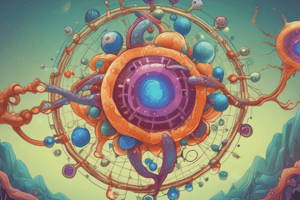Podcast
Questions and Answers
What is the primary function of the centromere in a chromosome?
What is the primary function of the centromere in a chromosome?
- To protect the chromosome from deterioration
- To initiate DNA replication
- To play a crucial role in the separation of chromosomes during cell division (correct)
- To determine the sex of an individual
Which type of chromosome determines the sex of an individual?
Which type of chromosome determines the sex of an individual?
- Sex chromosomes (correct)
- Autosomes
- Mitochondrial chromosomes
- Nuclear chromosomes
What is the term for a condition where a cell has an abnormal number of chromosomes?
What is the term for a condition where a cell has an abnormal number of chromosomes?
- Translocation
- Deletion
- Aneuploidy (correct)
- Mutation
What is the repetitive DNA sequence that caps the ends of chromosomes?
What is the repetitive DNA sequence that caps the ends of chromosomes?
How many chromosomes do humans have in each cell?
How many chromosomes do humans have in each cell?
What is the term for a type of chromosomal abnormality where a segment of a chromosome breaks off and attaches to a non-homologous chromosome?
What is the term for a type of chromosomal abnormality where a segment of a chromosome breaks off and attaches to a non-homologous chromosome?
Flashcards are hidden until you start studying
Study Notes
Structure of Chromosomes
- A chromosome is a thread-like structure made up of DNA and proteins that carry genetic information in the nucleus of eukaryotic cells.
- Chromosomes are found in the nucleus of eukaryotic cells and in the nucleoid region of prokaryotic cells.
Components of Chromosomes
- Centromere: a specialized region near the center of the chromosome that plays a crucial role in the separation of chromosomes during cell division.
- Telomeres: repetitive DNA sequences (TTAGGG in humans) that cap the ends of chromosomes, protecting them from deterioration and fusion.
- Origins of replication: regions where DNA replication is initiated.
Types of Chromosomes
- Autosomes: non-sex chromosomes that are identical in both males and females.
- Sex chromosomes: X and Y chromosomes that determine the sex of an individual (XX for females and XY for males).
Number of Chromosomes
- Humans have 23 pairs of chromosomes, for a total of 46 chromosomes per cell.
- The number of chromosomes can vary between species.
Chromosomal Abnormalities
- Aneuploidy: a condition where a cell has an abnormal number of chromosomes, which can lead to genetic disorders.
- Translocation: a type of chromosomal abnormality where a segment of a chromosome breaks off and attaches to a non-homologous chromosome.
- Deletion: a type of chromosomal abnormality where a segment of a chromosome is missing.
- Duplication: a type of chromosomal abnormality where a segment of a chromosome is copied and attached to the same chromosome.
Studying That Suits You
Use AI to generate personalized quizzes and flashcards to suit your learning preferences.




